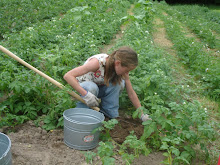
It’s January 3rd and it’s been windy, damp and grey out all day. It’s now sleeting out. What a perfect time to reminisce about making hay. This morning I fed my goats and sheep some hay that looked about like the day we made it; leafy, a beautiful shade of green, smelled like a breath of summer.
Back in the day, farmers used to cut hay by hand with a scythe (think grim reaper style) it was then left to dry in the sun and finally piled up someplace, usually in a hay mow. They had to salt these piles to keep them from starting on fire since large volumes of organic matter tend to put off a lot of heat and eventually become combustable. Like most aspects of farming, making hay has been mechanized and today their exists all manner of machinery to assist farmers in making hay faster and more efficiently.
Even though a lot has changed in the making of hay over the years one aspect of it has remained a constant, hell hath no fury like a farmer with hay down. This is an understandable constant since many factors have to come together before a decent bale of hay can be produced and most of these factors are beyond a farmer’s control. Besides actually raising a good crop which involves soil maintenance, plowing, seeding, etcetera, you also have to have a fairly lengthy stretch of dry and preferably sunny weather. This is all in addition to having an equally long stretch of no mechanical breakdowns.
If something should go awry, for example unpredictable rain or an impromptu engine overhaul, a farmer could potentially get a sub par crop, a crop that is much smaller than anticipated or worse, no hay at all. As a result, a farmer could end up with little or no grub for their critters in the winter thus they may have to either sell critters or buy hay. In short, there’s a lot riding on a hay crop.
I’ve helped my dad make hay in some capacity for the past 12 years. Over these hay seasons I’ve witnessed a fair share of furies spurred from making hay. I’ve seen my dad get frustrated over twisted twine, busted rake teeth, punctured tractor tires and broken belts. I’ve seen him out run thunder storms by coming down off steep field roads with a full load of hay rattling behind a chugging tractor in top gear. I’ve heard him swear like a sailor and seen him sweat like a butcher over his hay making endeavors.
This past summer, my dad promptly sprained his knee (making it pretty much impossible for him to drive a tractor) right after cutting all his hay. Hay that has been cut should be raked and baled as soon as it’s dry enough otherwise you risk exposure to moisture which is really bad for hay; it can deplete the nutritional value or even ruin it all together. As if my dad wasn’t already pressed for time, I had never raked with his new rake and needed to be trained in. My dad recruited my brother-in-law to run his baler for him and set to work teaching me the intricacies of running a V rake.
For the record, I’m used to running a circular rake (a totally different deal) and my dad is somewhat of a perfectionist plus we had that whole “hell’s fury” thing happening what with all that downed hay. The training session stretched through the better part of two days with my dad trailing me on his four-wheeler pretty much the entire time I was raking.
At first dad hollered out instructions from his four-wheeler perch with a note of gratitude in his voice. He concocted an intricate system of hand gestures which corresponded with the many positions that the rake had to be maneuvered into. But as the day wore on and I struggled with the higher speeds that the rake required and the fact that it doesn’t perform as it should on steeper hills, the hollering stopped and the barking began. I started concocting a few hand gestures of my own. Needless to say, by the time all the hay was raked, tempers were running a bit high as were rpms on the tractor.
Furies aside, making hay is actually a pretty enjoyable part of farming that is if everything goes right. You not only get to be outside in beautiful, sunny weather but you also get to enjoy the smell of fresh cut hay (quite possibly the best smell on earth). Additionally, when it’s all said and done you can look at the pile of bales and know you’ve been a part of producing something really important and tangible. The fun doesn’t stop there; you also get to feed your animals something tasty and green in the dead of winter (hay bales are really bales of summer) and animals get excited about and enjoy good hay.


No comments:
Post a Comment